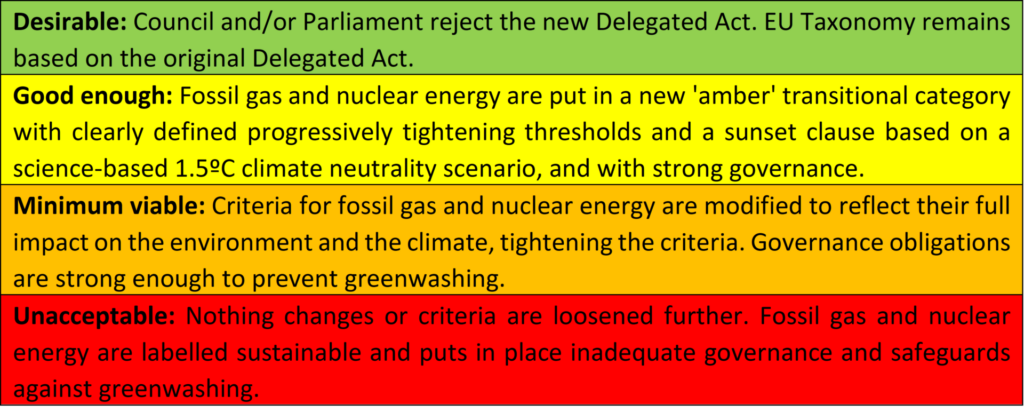- The European Commission will publish the final Complementary Delegated Act on the EU Taxonomy of Sustainable Activities on Wednesday, 2 February with the proposed labelling of fossil gas and nuclear energy investments as sustainable sparking an intense public debate.
- Reports suggest that the Commission will refrain from extensively redrafting the Delegated Act, leaving concerns of investors, the Platform on Sustainable Finance and Members of the European Parliament potentially unaddressed.
- The Council and European Parliament could still veto the proposal and will have up to six months to do so. Reactions today will set the scene for the months ahead, including the prospect of legal action.
Possible outcomes when the updated text is published
Different outcomes for the EU Taxonomy Delegated Act will result in differing levels of scientific integrity and support. The main options are:

What’s next?
Reactions to the Delegated Act from Member States, and especially from the European Parliament and the Council, could be critical for the fate of the EU Taxonomy.
- Will Council or Parliament announce a timeline for accepting or vetoing the Delegated Act? Both will have four to six months to veto the Delegated Act. So far, Member states haven’t shown a unified position, with some expectedly calling to loosen the criteria and others demanding more stringency. There is a division among MEPs, with positions mixing national positions and party lines.
- Will Germany announce an intention to veto the Delegated Act if there is no substantial change to the proposed treatment of nuclear power? Currently, four Member States have signalled an intention to veto the DA (Spain, Denmark, Luxemburg and Austria). A veto from the largest member state might tilt the political dynamics around the Taxonomy.
- Will a critical mass of MEPs emerge to object to the Delegated Act, or to the non-transparent process that has been followed to arrive at it? Many MEPs have voiced their concern both on the Delegated Act’s content and the lack of involvement of the Parliament and the public in deciding its content. The European Parliament can veto the Delegated Act with an absolute majority.
- Will Austria and Luxemburg (and others) confirm their intention to challenge the Delegated Act in court? A legal challenge could see the Delegated Act judged to violate the Taxonomy regulation and EU law. However, this would happen after the Delegated Act formally enters into force, adding uncertainty to regulatory burden for the private sector firms affected by the taxonomy regulation.
What are the main points of contention?
The proposed technical criteria have been under scrutiny from multiple angles. In particular, the Platform for Sustainable Finance has raised concerns that the current Delegated Act is not science-based. Whether the Commission has taken feedback into account and accordingly adapted the Delegated Act can be evaluated along with the following indicators:
- Does the proposal apply to life-cycle emissions or only direct emissions? The first draft of the Delegated Act only took direct emissions into account. However, the holistic approach of the Taxonomy clearly requires inclusion of life-cycle emissions, as per the already approved criteria in the previous legal act.
- Has the Commission changed the proposed thresholds for fossil gas to be classified as a substantial contribution to mitigation targets? Treating fossil gas as a special case violates the taxonomy’s technological neutrality principle, and the new higher thresholds which were proposed are not aligned with the EU’s climate targets, as outlined by the Platform on Sustainable Finance.
- Has the Commission included provisions for nuclear power regarding the ‘do no significant harm’ criteria for biodiversity, waste management and circular economy? Some of these provisions could refer to risks associated with the impact of radiation, mining and milling of uranium, as well as climate change and geological impacts.
- Has the Commission acknowledged the transition character of gas and nuclear by introducing an amber category? This was proposed from MEP side, as well as civil society organisations and some member states as a potential solution forward to salvage the integrity of the taxonomy.
- Has the Commission made change in relation to the timeline for climate transition? The transition timelines need to be tightened, including deadlines for issuing permits for new gas-fired and nuclear power plants, as well as fuel switch to low-carbon gases and the establishment of long-term nuclear waste disposal facilities.
- Who will enforce the proposed new requirements for fossil gas and nuclear? The special criteria for gas and nuclear will require strong oversight, including the potential need for retrospective removal of ‘sustainable’ labelling if conditions are not met over time. The original draft of the Delegated Act did not provide details of how this would work or who would be responsible.
- Has an impact assessment been planned or completed for fossil gas or nuclear power? So far the Commission has refused to conduct an impact assessment for the new elements in the Delegated Act. Such an assessment will be necessary to maintain the integrity of the Taxonomy.
Available for comment
E3G experts are available for commentary – please contact them directly:
Johannes Schroeten, E3G Policy Advisor, EU Sustainable Finance (including Germany)
+49 (0)160 9596 4443 | johannes.schroeten@e3g.org
Kate Levick, Associate Director, Sustainable Finance, E3G
+44 (0)7860 861225 | kate.levick@e3g.org
Lisa Fischer, Programme Leader, Climate Neutral Energy Systems
+44 (0) 7710 167754 | lisa.fischer@e3g.org
Notes to Editors
- E3G is an independent European climate change think tank with a global outlook. We work on the frontier of the climate landscape, tackling the barriers and advancing the solutions to a safe climate. Our goal is to translate climate politics, economics and policies into action. About – E3G
- For further enquiries email press@e3g.org or phone +44 (0)7783 787 863
- E3G has been following the developments around the Taxonomy closely. Our experts have published several analytical pieces covering the implication of the Taxonomy on the EU’s international climate leadership and mapping possible ways forward from the current impasse.



